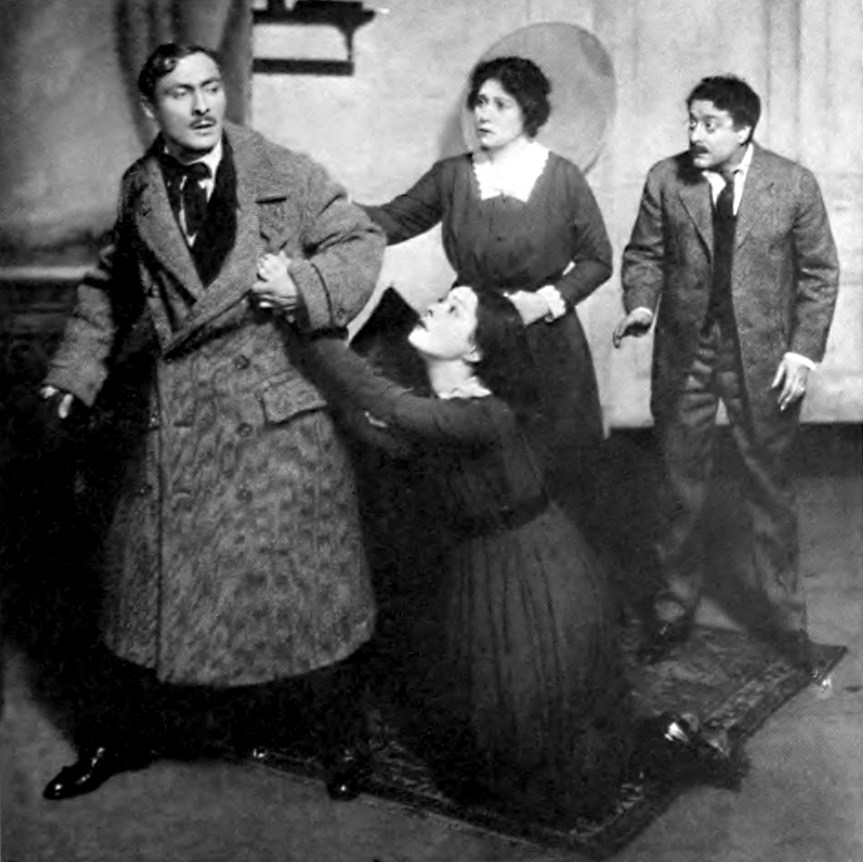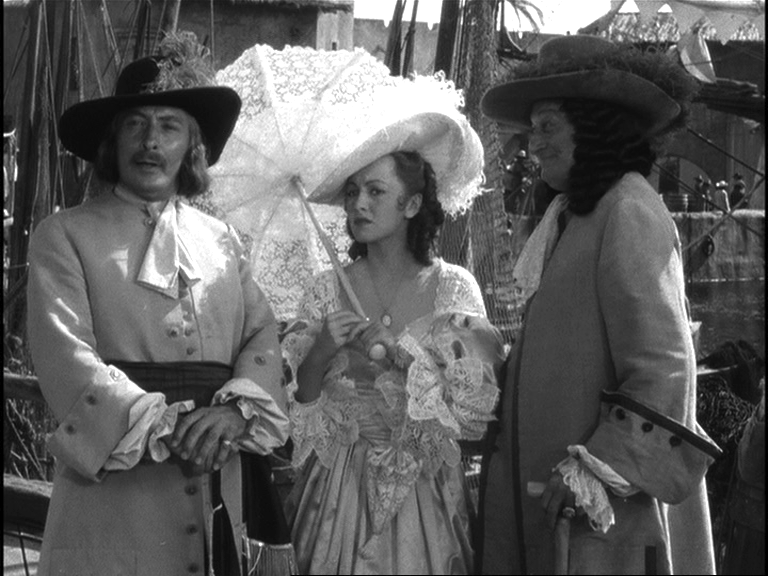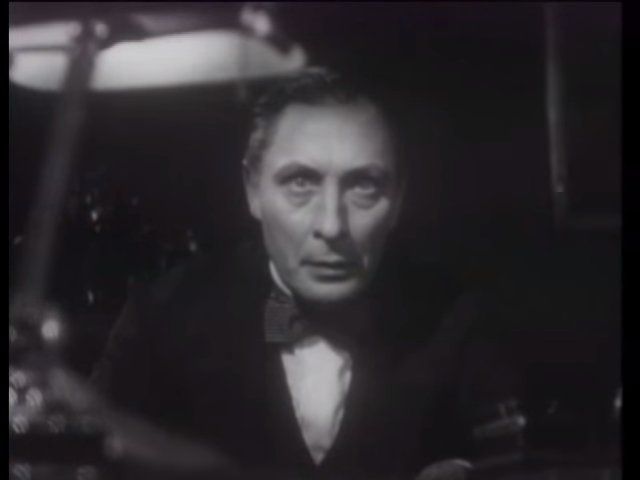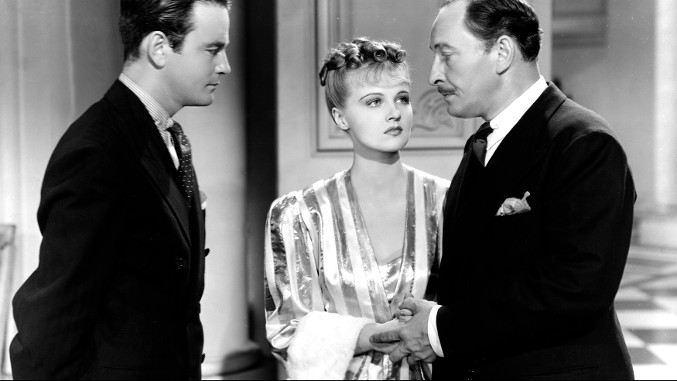Lionel Atwill, a fixture of action and horror films throughout the 1930s and 1940s, is a familiar face whose background was unknown to me, so I figured he’d be great to write about for the 7th Annual What A Character! Blogathon. To be honest, there’s a lot more story here than I expected.

Atwill was born to a wealthy family in the Croydon area of London in 1885. Nicknamed “Pinky” due to his reddish hair, he studied to be an architect but that apparently didn’t last — by age 20, he’d made his acting debut at the Garrick Theatre. By 1915, he’d gone to the United States, and he was appearing in silent films by 1918. His posh British accent and authoritative voice allowed him to thrive after the conversion to sound. Per his IMDB filmography, Atwill made at least four films, and as many as 9, every year in the 1930s and early 1940s, portraying mad scientists, police inspectors, tyrannical island governors, and other stern authority figures who often had a sinister side. Atwill, in fact, seemed to gravitate toward this type of role. If you’ve seen two-strip Technicolor masterpiece Doctor X, or The Vampire Bat, Mystery of the Wax Museum, Captain Blood, The Secrets of Dr. Kildare, the Universal Frankenstein pictures, or House of Dracula, you’ve seen Atwill. Unlike some thespians, then and now, who make the leap from stage to big or small screen, he never sought to distance himself from talkies, and seemed to enjoy making films:
‘I am one of those few stage actors who really like the films, and admit it!’ proclaimed Lionel to The New York Times (August 14, 1932), returning east as Doctor X premiered. It had always been the fashion of theatre stars to patronize the movies, but Lionel praised the work, the West Coast climate and the challenge of acting in films versus playing on the stage:
quoted in Hollywood’s Maddest Doctors: Lionel Atwill, Colin Clive, and George Zucco
‘There are two different techniques. That is why some stage actors are not in pictures and why some movie stars fail on the stage. It is easier for the former to learn the other mode than the latter.’
by Gregory William Mank
He also wanted very much to become a producer, and in 1941, had spent $25,000 to obtain the rights to a novel, The Dark River, with James Whale reportedly set to direct.

Atwill as the title character in DOCTOR X. 
On Broadway with Alla Naizmova in The Wild Duck 
As Colonel Bishop in CAPTAIN BLOOD 

With Lew Ayres (left) in THE SECRET OF DR. KILDARE
That film was never made, however, and in the mid-’40s, Atwill’s credits start to wane. This was a direct result of his long-rumored real-life sinister side — throwing wild (some might say degenerate) parties — becoming more generally known. There had been rumors for years that the Atwill residence in Pacific Palisades was the venue for orgies and p0rnography viewing, and some even said Atwill produced and directed X-rated films himself. Sometime over the 1940-41 holiday season, Atwill played host to a “grand, old-time Hollywood Yuletide orgy,” according to one attendee who later attempted to blackmail him. He presented some p0rn and afterward, the guests imitated what they had seen. When a related case landed in court, the orgy became public knowledge. The actor was forced to perjure himself in front of a grand jury, and to bribe a check-forger to back him up. On June 2, 1941, the grand jury decided that they believed him when he swore that he indeed owned no p0rn at all, that the films were travelogues, and that the orgy was actually just a wholesome gathering of some of the leading lights of the film colony.
Atwill was on borrowed time though. In 1942, the Yuletide affair was back in court, and he was indicted for felony perjury, found guilty, and sentenced to five years probation. Seven months later, facing a blackmail attempt, Atwill went back to the judge and confessed all, maintaining that he’d lied to protect his friends. Though the judge commuted his sentence and expunged his record, the Hays Office took a dim view of any feature with him in it. Atwill’s career was effectively done. Until his death from pneumonia related to lung cancer in 1946, his film appearances were limited to those for Producers Releasing Corporation, the studio that put the poverty in Poverty Row. He had carved himself an eternal place in the classic horror pantheon, but I suspect I’ll never look at Doctor X the same way again.
My main source for this post is the book quoted above, Hollywood’s Maddest Doctors: Lionel Atwill, Colin Clive, and George Zucco by Gregory William Mank.
This post is part of the 7th Annual What A Character! Blogathon.
Day 1 posts are here. Day 2 posts are here. Day 3 posts are here.



Wow! You got a lot of the ‘dirt’ on this character! He never came across as a likeable fellow in the roles i saw him, but then again he was cast as a lot of evil and bad parts. I’m sure the real story you relate here is just the tip of the iceberg, and while it would be easy to infer other characteristics (a Brit who heads to America just after WWI breaks out?) i wonder what else lurks in the heart of this character actor… Good catch, and thanks for taking me to the darker side of Hollywood!
You’re welcome…I think. Part of me wishes I’d never found out! No one could have been more surprised than I was. And yes, I noticed the timing of his departure for the US as well. He would have been around 30 years old. His son, who was in the RAF, was killed in WWII, in April 1941.
OMG – that Pinky was quite a rogue! This is truly a case of the off-screen story being more, shall we say, compelling, than the on-screen work. He made a big impact on screen, but, apparently, a bigger one in dubious circles. Thanks for a great read and for co-hosting this fun blogathon.
Dubious is a good word. You’re welcome, and thank you for participating!
I’ve read some of Atwill’s shenanigans, but it’s a great addition to this event given most of our faves are angels. 🙂
Great stuff, Paula.
Aurora
It is pretty different to my usual What A Character! posts. Thanks, Aurora!
Whoa! Who knew! A double life, indeed.
Exactly. I was looking at his IMDB and maybe his “extracurriculars” were the reason why was so good at playing corrupt authority figures. Thank you for stopping by 🙂
Jeez! That’s really something! Pretty sad how he kind of ruined his own career due to rather poor personal choices. This was very interesting to read. As you said, I don’t think I’ll view his films the same way again.
I agree, he was own worst enemy. Ironically I think if he hadn’t lied about it, the studio might have been able to salvage the situation. Thanks for stopping by.
It always seems the same. These types always seem to get caught for the cover-up and not the crime itself.
Guess I’m a little late here – just found your great blog. For those interested, Neil Pettigrew has written the definitive biography of our star in question: Lionel Atwill: The Exquisite Villain. . I’m no expert on the case, but there are those who have said the worst thing that happened at Atwill’s house was the projection of porn movies. Whether that is true or not, it is almost certainly true that “Tinseltown appealed to the gregarious side of Atwill’s personality. He was not a private man of quiet homely pursuits shunning the social scene like some. He was an avid party-goer as well as a keen charity event organizer. If he was around today, he would no doubt be all over social media forums such as Twitter. ” It is never an acceptable defense for someone guilty of something to say that “he didn’t do anything more than a lot of other people were doing” but still, it appears to be a true statement in this case. And while I’ll stop short of naming names – there were plenty of atrocious shenanigans taking place in Hollywood at this time, and by far bigger stars than atwill. This particular case centered around Sylvia Hamalaine, (unpleasantly only a teeneager at the time) who’d come to Hollywood to seek her fortune and shared an apartment with dress designer, Virginia Lopez. The juvenile was allegedly molested, somewhere, by a man named Adolphe LaRue with Ms. Lopez also present and apparently a participant. Atwill had no connection to the incident or the location. As blogger Ian Champion points out, “Here the matter should have rested. To her credit, Hamalaine withstood cross-examination attempts to implicate Atwill; the foreman of the jury acquitting the defendants on lack of evidence stated it was ‘regrettable that celebrities should be dragged into such a matter without any proven involvement’ – and even Judge Ambrose felt the details of Atwill’s testimony should not have been revealed to the press.
Predictably, Atwill underwent a form of trial by media, reporters desperately searching for any more salacious gossip to titillate their readers. This too would eventually have blown over – except that Atwill had not told the truth about his home entertainment. It emerged that he had lied about actually showing blue movies at his house. As harmless as this is, even in the context of the Hamalaine trial, there was no getting around the fact that he had committed the crime of perjury.. ” Atwill is quoted as saying something to the effect that Universal seemed to be un-phased by all this unpleasant publicity and saved him from being unemployed during this trying period.
Welcome to the blog! Interesting comment. Where is that quotation from?
Baz Luhrmann should do a biopic of Lionel.
Ha! I’d watch that!